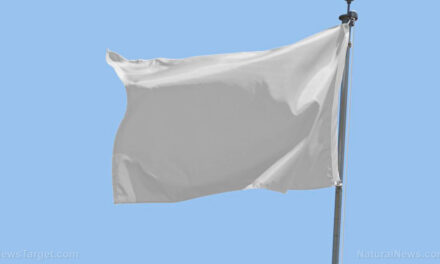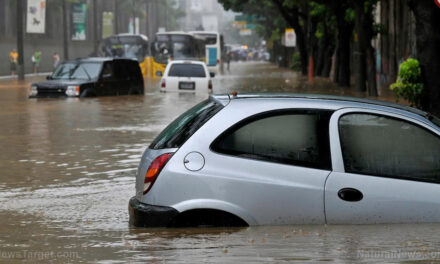We support our Publishers and Content Creators. You can view this story on their website by CLICKING HERE.
REPORT: Israel attacks UN peacekeepers using WHITE PHOSPHORUS, injuring at least 15
The Israeli military has been accused of forcibly entering a United Nations peacekeeping base in Lebanon and allegedly using white phosphorus in an attack that injured 15 peacekeepers.
This claim is based on a confidential report from a country contributing troops to the United Nations Interim Force in Lebanon (UNIFIL). The report outlines several attacks on UN troops, with incidents of damage to UN facilities and injuries to personnel at border posts in southern Lebanon. (Related: Israel sends tank to attack UN peacekeepers watchtower in southern Lebanon.)
The reported incident occurred on Oct. 13, when two Israeli Merkava main battle tanks allegedly broke through the gates of a UNIFIL base. The tanks remained for 45 minutes before withdrawing following protests from UNIFIL officials. The precise location of the base was not specified, but it is believed that the incident took place at a UNIFIL post in Ramyah, a village that is less than a mile from the Israeli border.
Shortly after the tanks left, several rounds were fired about 100 meters north of the UN base, emitting smoke suspected to contain white phosphorus. This chemical caused skin irritation and gastrointestinal issues in the peacekeepers. A total of 15 were treated for injuries caused by the suspected white phosphorus.
Israel denies using white phosphorus to target UN peacekeepers
The Israeli military responded by claiming that one of its tanks had only reversed “several meters” into the UNIFIL gate, stating it was part of an attempt to evacuate injured soldiers. The military also acknowledged using smoke screens during the maneuver but denied using white phosphorus to target UN personnel. Israel’s defense forces emphasized that their actions were intended to protect their soldiers amid the ongoing conflict.
White phosphorus is a chemical that burns when exposed to air, creating thick smoke and intense heat. It is often used in military operations to create smoke screens or mark targets. However, its use in densely populated civilian areas is banned under international law due to the indiscriminate harm it causes. While the substance is not prohibited in all contexts, international laws governing armed conflicts strictly regulate its use.
UN Secretary-General Antonio Guterres condemned the targeting of UN peacekeepers as “intolerable” and demanded that such incidents stop immediately.
Spanish Prime Minister Pedro Sanchez went further, urging nations to halt weapons sales to Israel in light of the attacks.
French President Emmanuel Macron also condemned the deliberate targeting of UN personnel and summoned Israel’s ambassador to Paris for explanations.
China joined the chorus of international disapproval, with its foreign ministry expressing “grave concern and strong condemnation” over the attacks.
U.S. Secretary of Defense Lloyd Austin voiced his concerns to his Israeli counterpart, urging the protection of UN personnel stationed near the border. While the U.S. has generally backed Israel’s right to defend itself, the White House has called for the protection of peacekeepers as part of a broader appeal for restraint in the conflict.
Israel’s attacks against Lebanon has displaced more than 1.2 million people so far.
Watch this short video discussing how Israel is using chemical weapons on UNIFIL.
This video is from the Cadkiah channel on Brighteon.com.
More related stories:
Hezbollah destroys Israeli Merkava tanks, kills and injures IDF troops infiltrating southern Lebanon.
UN under fire in Lebanon: Israeli tank fired at peacekeepers’ watchtower.
Footage appears to show Israel once again using illegal white phosphorus in southern Lebanon attack.
ENVIRONMENTAL TERRORISM: Israel bombards southern Lebanon with TOXIC white phosphorus.
Sources include:

 Conservative
Conservative  Search
Search Trending
Trending Current News
Current News 




